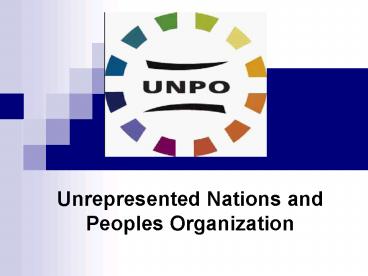Unrepresented Nations and Peoples Organization - PowerPoint PPT Presentation
1 / 12
Title:
Unrepresented Nations and Peoples Organization
Description:
the greater freedom and dignity to which all peoples ... Dalai Lama on. the first decade. of UNPO activities. in the international. arena: UNPO at a glance ... – PowerPoint PPT presentation
Number of Views:52
Avg rating:3.0/5.0
Title: Unrepresented Nations and Peoples Organization
1
- Unrepresented Nations andPeoples Organization
2
Statement by His Holiness the Dalai Lama on the
first decade of UNPO activities in the
international arena
UNPOs objective is to assist its Members to
achieve the greater freedom and dignity to which
all peoples have a right. As a result of UNPOs
existence, the awareness and understanding of
problems faced by oppressed peoples everywhere
have increased in the international community. At
the same time, many of us feel more empowered to
advance our cause through non-violent means.
3
UNPO at a glance
- The Unrepresented Nations and Peoples
Organization (UNPO) is a democratic membership
organization representing peoples rights in
international and national levels. - While UNPO Members may differ in their goals and
aspirations, they all share one condition they
are not represented in major international forum,
such as the United Nations. - The five principles that form the basis of the
UNPO Covenant Non-violence, Human Rights,
Self-determination and democracy, Environmental
Protection and Tolerance.
4
Historical background
- On February 11, 1991, UNPO was founded at the
Peace Palace, The Hague, the location of the
International Court of Justice. - Founding Members representatives of Armenia,
Australian Aboriginals, the Cordillera, the
Crimean Tatars, East Turkestan, Estonia, Georgia,
the Greek Minority in Albania, Iraqi Kurdistan,
Latvia, Palau, Taiwan, Tatarstan, Tibet and
West-Papua. - Members admitted to UN Estonia, Latvia, Armenia,
Georgia, Palau and East Timor. - UNPO has been awarded the 1991 Tolerance Award,
1992 Social Innovation Award, 1998 Petra Kelly
Peace Award (Heinrich Böll Foundation) and was
nominated for the 1993 Nobel Peace Prize.
5
Members of UNPO
- Indigenous peoples, occupied nations, minorities
and independent states or territories who are not
represented at the UN.
Charter Nation or People shall mean a group of
human beings which possesses the will to be
identified as a nation or people and to determine
its common destiny as a nation or people, and is
bound to a common heritage which can be
historical, racial, ethnic, linguistic, cultural,
religious or territorial. A section of a people
constituting a minority, living on a portion of
its ancestral territory, incorporated into a
State other than a State represented by that
people Each Member must have a
Representative Body.
6
- Today, more than 60 Members, representing over
150 million people worldwide, make up the
organization.
7
(No Transcript)
8
Requirements to members
- Belief in equality of all Nations and Peoples and
in their right to self-determination - Adherence to the internationally accepted human
rights standards - Adherence to the principles of democratic
pluralism and rejection of totalitarianism and
any forms of religious intolerance - Rejection of terrorism as an instrument of policy
- Respect for all peoples and population groups
9
Organizational structure
- General Assembly
- Steering Committee
- General Secretary in Hague
- (Netherlands)
- Coordination offices in Washington
- (USA) and Tartu (Estonia)
VII General Assembly, Closing Session The Hague
City Hall, The Netherlands
10
Programs
- Effective participation program
- National Parliaments and EU
- Conflict prevention program
- Election monitoring missions
- Training programs and seminars
Special Emissary Adelard Blackman of the
Buffalo River Dene Nation participating at a UNPO
seminar
UNPO Election Monitoring Mission, Taiwan 2001
11
Why is it so difficult for the state
leaders to ensure that nations and peoples have a
right to and deserve basic human qualities
such as dignity, respect, self-confidence and
pride in whom they are? Why is it so difficult
for the state leaders to ensure that nations and
peoples need and deserve recognition and some
level of self-government and autonomy? In fact, I
firmly believe that the former cannot exist
without the latter.It is the UNPO mission to
remind the world community that these qualities
are necessary for all the nations and peoples to
possess if we really want to make the world a
better place for all and just not for a few.
Extract from Opening Speech to the VIII UNPO
General Assembly By Göran Hansson, Chairman of
the UNPO
12
(No Transcript)































